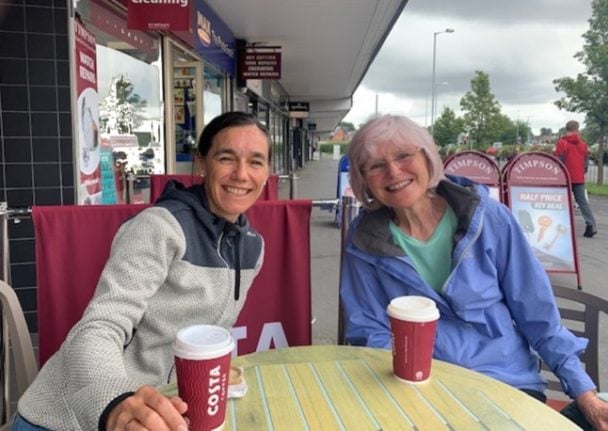I have lived in Germany for 26 years but this summer has been the most difficult and complicated year to get back to the UK and visit family. My summer plans were a mixture of excitement, worry, frustration and hours and hours of scouring the net for information!
The original plan was that my husband, who’s a teacher, and I drive over to the UK for three weeks. We wanted to have enough time to visit relatives and also spend time sightseeing this wonderful island. These plans kept us going through a very challenging school year. April, May and June passed and regulations in the UK were still pretty tight not allowing visitors, even if they were fully vaccinated, to visit the country without going into self-isolation.
Unlike Germany, there were no “special” regulations for families to be reunited and I had to face the fact that I was being treated just like millions of other European tourists. My British passport seemed irrelevant. As July approached we started to get unrestful – the summer holidays were looming ahead and we had nothing booked. We set a deadline for ourselves and if nothing had changed by the end of July we would scrap our plans to go the UK. My poor family in England were left dangling – are they coming or not?
READ ALSO: Better than I could have imaged – how foreigners feel about being able to travel to Germany
‘Gave up all hope’
With no change of restrictions by the end of July we gave up all hope of traveling to Britain. Going into self-isolation was not an option for us. I was feeling pretty despondent and as a comfort we spontaneously booked a non-refundable holiday travelling in Austria and Italy. As fully vaccinated travellers living in Germany this was no problem. I had just started to get excited about our new holiday plans when the British government finally got round to changing travel restrictions at the beginning of August.
Now I was in a mess! How can I go round travelling in Europe when I haven’t seen my family for over a year? I decided to spontaneously slot in a week’s visit to the UK before going on holiday to Austria.
I quickly booked a flight before all seats were taken and started the process of wading through regulations.

The tricky part was flying on a Sunday but having a PCR test not older than 72 hours. How do I get my results at the doctor’s surgery at the weekend? Then I had to order an expensive PCR test in the UK for day two of my visit. Before the trip had even started I had spent nearly 200€ on tests. Good that I was travelling alone and not with my husband and three children.
Just before flying off to UK and anxiously awaiting my PCR test results, I discovered that Austria and Italy do not allow anyone to enter the country if they have been in the UK in the past 14 days. Great… we had to cancel our holiday and lose money. The long awaited summer holidays were turning into a disaster and my stress levels were pretty high.
READ ALSO: How travel to England from Germany has become stricter
Reunion with family
Yet the unbelievable seemed to happen – I arrived in the UK safely and had a lovely reunion with my precious family. Everyone was happy but the trip was over-shadowed by coronavirus. My day two PCR test results came through half way through the week. Fortunately they were negative and so now the holiday could really begin. A day later a family member announced that she was ill and had tested positive. The rest of the family appointments were all cancelled and everyone had to do a PCR test and wait anxiously for results. My biggest worry was if I could get back to Germany.

Week three of my summer holidays: sitting here in Germany after getting back from UK without having caught Covid. Needed a couple of days to recover from all the stress whilst travelling. My husband and I have spontaneously booked yet another holiday but just locally in Germany. After the booking confirmation came through, I discovered that Austria have yet again changed their travel restrictions and I can now enter their country. It’s not even worth thinking “what if….”
This summer holiday has been pretty exhausting and as I approach the end of it, I am feeling pretty drained when it comes to travel. I am almost looking forward to just getting back to work. As I write these lines I realise that I am complaining on a pretty high level and my problems are luxury problems. My family and I are all well and have managed to see one another. We have a house, plus work and peace in our country. Maybe my chaotic summer was there to teach my what really counts in life.



 Please whitelist us to continue reading.
Please whitelist us to continue reading.
I shared some of Michelle’s worry and frustration but did have a rather easier ride over to UK, after postponing twice earlier in the summer. My ten-day trip at the beginning of this month was to visit family and friends for the first time in over a year, especially to see how my 97-yo mum was faring. As it happens, I saw everyone I wanted to except mum. After dodging the virus for eighteen months, it finally broke through the defences of her care home. Most of the residents and staff were infected and were forced to adopt a strict isolation policy with no visitors allowed. Fortunately, they’d all been double vaccinated and have recovered remarkably well, but the curfew was only lifted on the day after my return to Germany.
I did have a momentary wobble when the passport officer at Frankfurt airport asked the purpose of my visit. My reply “I live here” brought a request to see my ID card and Covid-pass, swiftly flashed and sailed through to get back home.